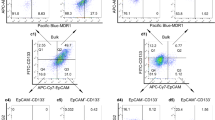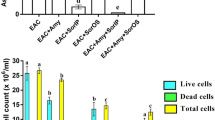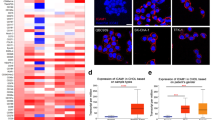Abstract
In vitro studies were initiated to study the antitumour effect of protein-doxorubicin (DXR) conjugate on the growth of the multidrug resistant rat ascites hepatoma cell line, AH66DR. The 50% inhibitory concentration (IC50) for DXR in AH66DR cell line was 16 mumol l-1 (AH66 parental cell line, AH66P, IC50 was 0.08 mumol l-1). Treatment of AH66P and AH66DR cells with various concentrations of DXR or conjugates at equivalent concentrations of DXR was performed. The two types of conjugates used were bovine serum albumin (BSA)-DXR conjugate and immunoglobulin G (IgG)-DXR conjugate. Both of these conjugates showed potent dose-dependent inhibition of cell growth against AH66DR cells as compared with the cells treated with DXR or other controls. The IC50 for BSA-DXR and IgG-DXR conjugates in AH66DR cell line was 0.05 (equivalent DXR) mumol l-1 and 0.07 (equivalent DXR) mumol l-1, respectively. These values were similar to that of the AH66P treated with DXR. Cellular uptake and accumulation of DXR or BSA-DXR conjugate was also quantitated in both cell lines. The cellular concentration of DXR in AH66DR cells was 2-fold lower than that of AH66P cells throughout the experiment. In contrast, by the treatment of AH66DR cells with BSA-DXR conjugate, the intracellular drug concentration increased as a function of time up to 24 h (639.1 +/- 41.8, equivalent DXR, ng 10(-5) cells) and reached the same drug level as AH66P cells treated with DXR (617.9 +/- 17.3 ng-5 cells). Ammonium chloride treatment inhibited the effects of the conjugates but did not inhibit the free drugs. Intracellular DXR was effluxed rapidly from AH66DR cells, but BSA-DXR conjugate remained in the cells at relatively high concentration for a long time. These results indicate that by chemically modifying DXR, such as by conjugation of the drug with proteins, it may be possible to overcome multidrug resistance.
This is a preview of subscription content, access via your institution
Access options
Subscribe to this journal
Receive 24 print issues and online access
$259.00 per year
only $10.79 per issue
Buy this article
- Purchase on Springer Link
- Instant access to full article PDF
Prices may be subject to local taxes which are calculated during checkout
Similar content being viewed by others
Author information
Authors and Affiliations
Rights and permissions
About this article
Cite this article
Ohkawa, K., Hatano, T., Tsukada, Y. et al. Chemotherapeutic efficacy of the protein-doxorubicin conjugates on multidrug resistant rat hepatoma cell line in vitro. Br J Cancer 67, 274–278 (1993). https://doi.org/10.1038/bjc.1993.52
Issue Date:
DOI: https://doi.org/10.1038/bjc.1993.52
This article is cited by
-
Conjugates of Anthracycline Antibiotics with Macromolecules
Pharmaceutical Chemistry Journal (2015)
-
Cellular membranes function as a storage compartment for celecoxib
Journal of Molecular Medicine (2009)
-
Conformational change in the active center region of GST P1-1, due to binding of a synthetic conjugate of DXR with GSH, enhanced JNK-mediated apoptosis
Apoptosis (2007)
-
Caspase-3 activation during apoptosis caused by glutathione–doxorubicin conjugate
British Journal of Cancer (1999)



